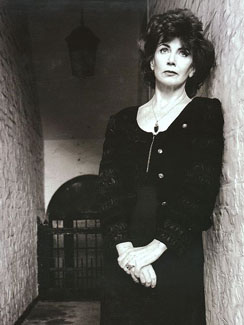
12 Dec 2010 03:44:51
Linguistic embroidery -- plus snatches of poetry and a shower of literary and theatrical allusions -- clouds the poignancy of this melancholy love triangle.
Premiered last year at Manchester's Royal Exchange Theater, the polished production directed by Braham Murray comes to New York for a month as the centerpiece of the annual Brits Off Broadway season. Its cast includes Brenda Blethyn, last seen on the city's stages in the 2004 Broadway revival of Marsha Norman's "'night, Mother."
True to its title, the play opens with Jack Berry (Niall Buggy), a benign-looking figure in cardigan and corduroys, wailing "Stay... stay" at the ghostly images of two women seen through the translucent walls of Simon Higlett's emerald green semicircular set.
In an opening monologue that establishes the flowery discursiveness of Jack's conversational style, he recalls meeting and marrying the lusty Gladys, who clashed with his more genteel mother, causing a rift with his family. He left Gladys briefly for another woman but then returned to a marriage that, for him at least, had lost its glow.
That's a lot of narrative to wade through even before the play gets going. It does so, however, when cash-strapped young elocution teacher Hazel (Beth Cooke) comes to Jack's door in the outer London suburbs, receiving an angora sweater belonging to Gladys as added enticement to return.
While Hazel assumes Mr. Berry is a widower, Blethyn's Gladys is very much alive, bringing in the couple's sole income as supervisor in a doll factory. An early reference to Edward Albee finds vague echoes in the cryptic dialogue and absurdist tone of the Berrys' exchanges, and more explicit ones in their childless void.
Jack navigates a tricky double life between the two women, each one oblivious to the other. He is reinvigorated by his afternoons of platonic pleasure and more than a hint of unrequited love with Hazel. By night, he placates and deceives self-deluding Gladys as she wonders why her wardrobe and jewelry collection keep shrinking.
All three characters drift often into reveries about the past, like a trio of Amanda Wingfields, which gives the play an eccentric charm but also a nagging evasiveness. The drama is too airy-fairy to support much emotional weight.
When suspicious Gladys tricks Jack into revealing his daytime trysts, the devastating clash that should ensue (Eugene O'Neill is another significant reference around this point) instead gets smothered in fussy verbiage. And despite the play's eerie set-up, its conclusion is disappointingly ordinary.
Part of the problem is also Blethyn's large performance. She can be a delight in playful mode, packed into tight skirts and clingy knits as she flirts with caricature, at times approaching the campy extremes of a pantomime dame. But her arsenal of fluttery mannerisms makes it hard to buy the character as a real person in real pain.
Premiered last year at Manchester's Royal Exchange Theater, the polished production directed by Braham Murray comes to New York for a month as the centerpiece of the annual Brits Off Broadway season. Its cast includes Brenda Blethyn, last seen on the city's stages in the 2004 Broadway revival of Marsha Norman's "'night, Mother."
True to its title, the play opens with Jack Berry (Niall Buggy), a benign-looking figure in cardigan and corduroys, wailing "Stay... stay" at the ghostly images of two women seen through the translucent walls of Simon Higlett's emerald green semicircular set.
In an opening monologue that establishes the flowery discursiveness of Jack's conversational style, he recalls meeting and marrying the lusty Gladys, who clashed with his more genteel mother, causing a rift with his family. He left Gladys briefly for another woman but then returned to a marriage that, for him at least, had lost its glow.
That's a lot of narrative to wade through even before the play gets going. It does so, however, when cash-strapped young elocution teacher Hazel (Beth Cooke) comes to Jack's door in the outer London suburbs, receiving an angora sweater belonging to Gladys as added enticement to return.
While Hazel assumes Mr. Berry is a widower, Blethyn's Gladys is very much alive, bringing in the couple's sole income as supervisor in a doll factory. An early reference to Edward Albee finds vague echoes in the cryptic dialogue and absurdist tone of the Berrys' exchanges, and more explicit ones in their childless void.
Jack navigates a tricky double life between the two women, each one oblivious to the other. He is reinvigorated by his afternoons of platonic pleasure and more than a hint of unrequited love with Hazel. By night, he placates and deceives self-deluding Gladys as she wonders why her wardrobe and jewelry collection keep shrinking.
All three characters drift often into reveries about the past, like a trio of Amanda Wingfields, which gives the play an eccentric charm but also a nagging evasiveness. The drama is too airy-fairy to support much emotional weight.
When suspicious Gladys tricks Jack into revealing his daytime trysts, the devastating clash that should ensue (Eugene O'Neill is another significant reference around this point) instead gets smothered in fussy verbiage. And despite the play's eerie set-up, its conclusion is disappointingly ordinary.
Part of the problem is also Blethyn's large performance. She can be a delight in playful mode, packed into tight skirts and clingy knits as she flirts with caricature, at times approaching the campy extremes of a pantomime dame. But her arsenal of fluttery mannerisms makes it hard to buy the character as a real person in real pain.

